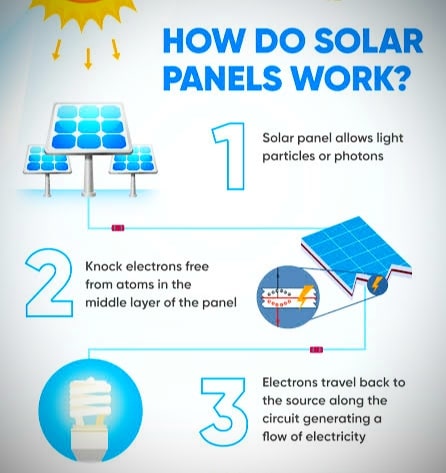How Solar Panels Work and Why They Are Important
Solar panels are devices that are used to convert sunlight into electricity. They are an important component of many different types of solar energy systems, including photovoltaic (PV) panels, concentrated solar power (CSP) systems, and solar water heaters.
When sunlight hits the solar cells, it knocks electrons loose from the atoms in the semiconductor material, creating a flow of electricity. This electricity can then be used to power a wide range of devices, from small handheld devices like calculators to large appliances like refrigerators.
Solar panels are a popular choice for people who want to reduce their carbon footprint and use renewable energy sources.
How do solar panels work?
(Edit pics: tatapower.com)
Solar panels work by using photovoltaic cells to convert sunlight into electricity. These cells are made of materials like silicon, which have the ability to convert photons, or particles of light, into an electric current.
When photons from the sun hit the solar panel, they are absorbed by the photovoltaic cells and cause the electrons in the cells to become excited.
This creates an electric current, which can then be used to power electrical devices or sent to the grid to be used by others.
What are solar panels used for?
Solar panels are used to generate electricity by converting sunlight into an electric current. This electricity can then be used to power homes, businesses, and other buildings.
Solar panels are often used in remote locations where it is difficult or expensive to connect to the electrical grid, but they are also used by many people as a source of renewable, clean energy.
In addition to generating electricity, solar panels can also be used to heat water for domestic or industrial use, and they are often used in solar-powered vehicles and other applications.
The Benefits and Advantages
There are many advantages to using solar energy, including the following:
- Solar energy is a clean, renewable resource that can help reduce our reliance on fossil fuels and minimize greenhouse gas emissions.
- Require very little maintenance and can last for many years.
- Can be generated wherever there is sunlight, so it is a versatile source of power.
- Can save money on electricity bills, especially in sunny climates.
- Can be used to power homes, businesses, and other buildings, even in remote areas where it is difficult to connect to the grid.
- Can be used in conjunction with other renewable energy sources, such as wind or hydro power, to create a more reliable and sustainable energy system.
Future Prospects
The prospect of solar panels in the future is very promising. As the technology continues to improve and costs continue to decrease, solar panels are becoming an increasingly attractive option for generating electricity.
They are a clean, renewable source of energy that can help reduce our reliance on fossil fuels and combat climate change. In many parts of the world, solar panels are already competitive with traditional forms of energy generation, and as the technology continues to advance, they are likely to become even more affordable and widespread.

Post a Comment for "How Solar Panels Work and Why They Are Important"